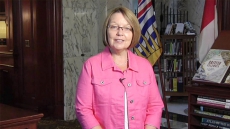CALGARY — The Racette family is on a cash-only diet for the next four years.
Dale Racette, a truck driver, and his wife, a school bus driver, are trying to dig themselves out of a $45,000 hole.
It wasn't any one thing. The day-to-day costs of raising two children just piled up over 14 years, Dale Racette said from Red Deer, Alta.
Two months ago, the Racettes sought the help of a credit counsellor to work out a debt repayment plan. The first step was to shred their six credit cards.
Racette says he's optimistic his job at a distribution company is safe, but he's lived through enough economic ups and downs in Alberta to know he can't take anything for granted.
"I think I'm pretty secure. I wouldn't bet a whole lot of money I don't have, mind you," he said.
According to Statistics Canada, Alberta lost 14,000 net jobs in February — 7,000 of those in the natural resources sector. Suncor Energy Inc. (TSX:SU), Cenovus Energy Inc. (TSX:CVE), Nexen ULC and ConocoPhillips Canada are among the big oil companies to have cut jobs as they grapple with low oil prices.
The pain is being felt in the public sector, too. In announcing a grim budget with a record $5-billion deficit last week, the Alberta government said it would be shedding 2,016 jobs. Most of those cuts will be through attrition, but around 370 layoffs are expected.
And there's another layer of hardship that doesn't grab headlines, said credit counsellor Nadia Graham.
"We're seeing people in the oil and gas industry who aren't necessarily getting laid off, but they haven't got their annual bonus, . . . (and) they aren't getting the overtime they normally get."
"It's putting a pinch on peoples' finances," Graham said. "The debt problems that we're seeing are not debt problems that have been created in the last, say, four months or so, but they're issues that have come to a head."
Jeff Schwartz, executive director of Consolidated Credit Counselling Services of Canada, said he saw a 38 per cent year-over-year increase in clientele from Alberta in February. Nationwide, there was also an increase — but in the order of 10 to 15 per cent.
Schwartz said he's not surprised by the numbers. A report by credit monitoring agency Equifax earlier this month said Calgarians had the highest non-mortgage debt loads in the country — an average of $28,263 in the last three months of 2014. Edmonton wasn't far behind, with average debt at $26,305.
"Albertans are in the deepest debt," said Schwartz. "They're used to earning big. When a boom cycle comes through, they do very well and that's a good thing. But as part of that, they also live big."
There was a 58.7 per cent increase in consumer proposals in Alberta between December 2013 and December 2014, according to Ottawa's latest insolvency statistics.
Bruce Alger, a licensed trustee at personal insolvency firm Grant Thornton in Calgary, said more than half the work he's doing these days is on consumer proposals — a legal process where debtors can pay some amounts owed to a creditor, without having to resort to bankruptcy.
Alger said he's already seen a bit of an uptick in clients asking him for help, but he's expecting to see an "influx" come summer or fall.
"As a lot, Albertans are typically young and optimistic and credit is readily available," said Alger. "It's been generally so good here for so long that if you survived 2008-2009 unscathed, you think 'wow, I can handle just about anything.'"





